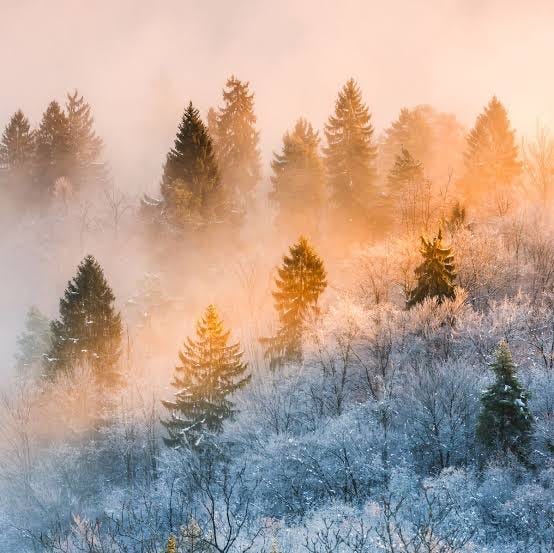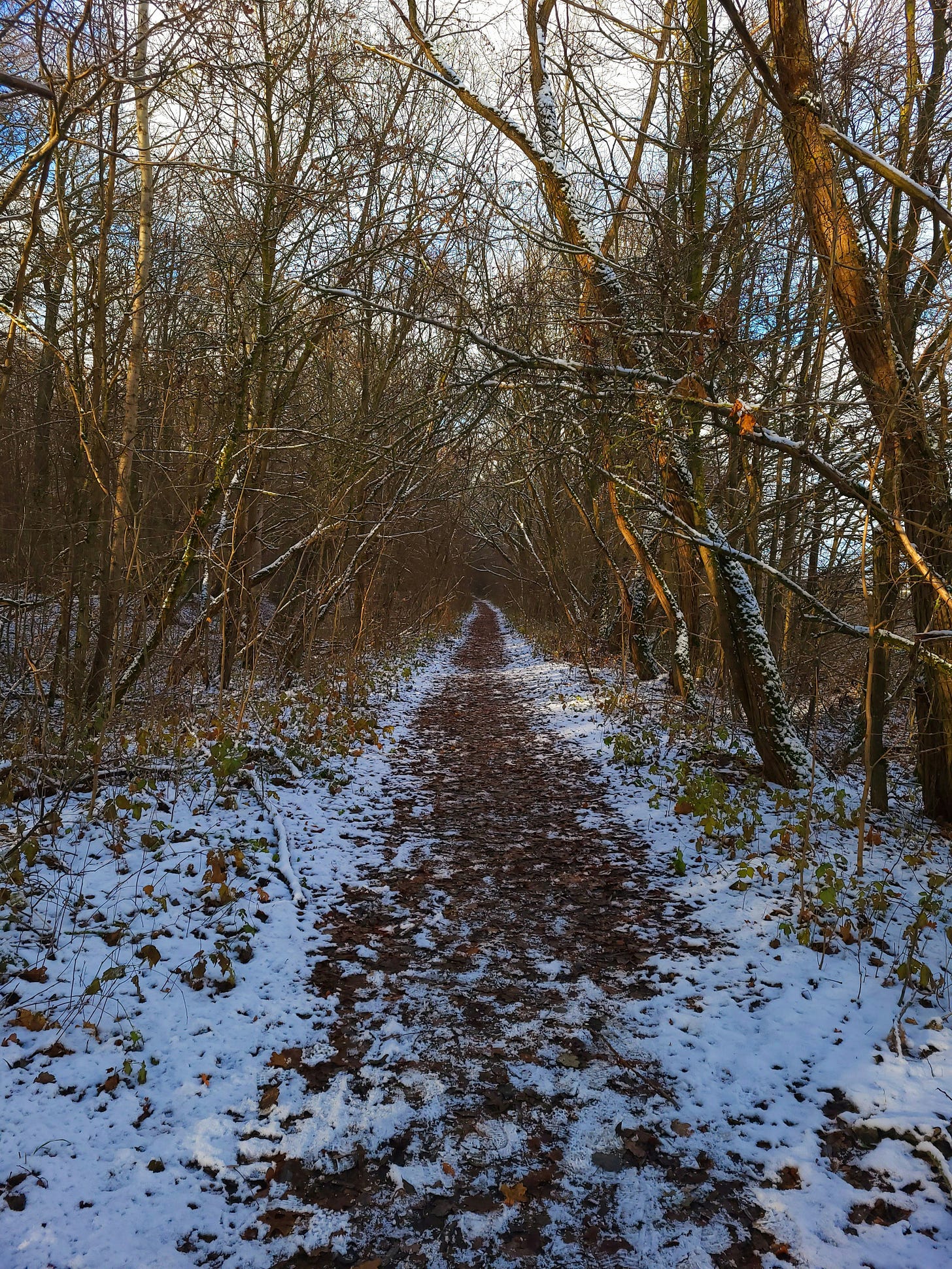Hello wild ones,
I hope you are all well and tending to yourselves in ways that feel nourishing. For my paid community members, please scroll down to the very bottom of my essay for a special audio recording just for you. And if you are a free subscriber, I invite you to carry on reading.
It is still winter in the northern hemisphere, and although there is hope for longer days and warmer temperatures ahead, the looming darkness and cold air still lingers around us, and within us. Winter, for many, seems to be more manageable during the holiday period in December as we gather with loved ones and share warming foods while tucked away in our heated homes - there is a sense of togetherness, even amongst the chill. I’ve been told that the holidays are celebrated in a much bigger and grander way in the northern hemisphere, and as a Canadian living in Australia for several years now I can see it too. And I can’t help but think that it's because it helps us get through the dark and cold days as our focus shifts to celebrating rather than surviving.
Once the new year arrives, we then ride on a new wave of energy that propels us into future visioning, goal setting, and excitement for what is to come. It feels new and fresh, hopeful, and promising, for a few weeks anyway. Then February rolls around, and with that often comes lower moods, less capacity, and a sense of urgency for spring to arrive. The celebrations and family gatherings are over, the new year rush has come and gone and maybe we didn’t stick to our intentions as we hoped we would, and we are still in the thick of winter navigating snow-covered roads, freezing temperatures, and a fleeting sun appearance.
In the natural world, winter is the time for animals to hibernate, plants to pause growing, and insects to stop buzzing. The world around us becomes quiet as it conserves its energy to survive the season and waits for the conditions to shift before blooming into full expression once again, a predictable cycle that comes and goes with each passing year. I don’t particularly enjoy colder temperatures, but I’ve come to appreciate the reliability of a reoccurring season that invites us too, alongside nature, to slow down, gather our resources, and go inwards and see what we find resting there within our bones.
Wintering, a term coined by naturalists to describe how animals survive the colder months, has been used by writers and poets, such as Katherine May and Seamus Heaney, to also describe how we humans navigate our own inner winter - the chapters of our lives that feel darker, colder, and lonelier. Just as nature so beautifully demonstrates each year, our own wintering is a time for our bodies to find rest and renegotiation when the clouds of life cast shadows on our days.
When I received an unexpected, albeit intuitively driven, cancer diagnosis, I found myself descending into my own dark cave to find respite from a loud and very opinionated world. It was a time for me to turn towards myself, and use what limited resources and capacity I had to tend to my immediate needs. It meant less socializing, a reduced work schedule, and keeping the white space on my calendar, not filling it just because I could.
Sometimes we need to peel back and pare down our lives to survive the season we are currently in, and to reevaluate, renegotiate, and then return more resourced from doing so, just like the bare branches of a tree in the thick of winter.
Life touches all of us, in varied ways, and we will be invited into our own wintering seasons for different reasons. Some of us will be invited to winter after losing a loved one, navigating physical illness, going through a separation, changing careers, or relocating, and for some of us we will be asked to winter when everything seems relatively stable in our environment, but our internal landscape doesn’t match that of the external. Either way, there’s always an invitation, sometimes we may miss the memo though.
I’ve had seasons when my body knew it was time to winter, but my mind kept churning forward despite the signs and symptoms begging me to slow down. I was exhausted, lacking motivation, easily tearful, irritable and moody, and my body was showing signs that things were unbalanced. But I kept going until my body no longer could - something I feel many of us do. Maybe we keep going because we don’t feel like “giving up”, maybe we keep going because we believe it’s not that bad, maybe we keep going because we’re afraid of the judgement and shame that comes with resting, or maybe we keep going because we have no other choice.
The truth is, living in a patriarchal and capitalist society makes honouring our inner winter seasons that much more difficult, something that is more accessible for those with privilege, myself included.
Wintering, although sounding romantic and poetic, is not a walk in the park, although walks in parks do help. It is a period to find respite, but it is also a tender, and often painful, time that brings us to our knees (figuratively and literally) and invites us to meet ourselves in places we’ve been avoiding. It’s about active rest, and that often invites discomfort, especially if we’re unfamiliar with what it means to slow down.
It’s not just bubble baths, long walks, and cozy blankets - it’s also radical honesty with ourselves and the people we love, it’s hard conversations that are years overdue, it’s feeling the depth of our feelings that we’ve pushed down for decades, and it’s coming to terms with, and accepting, our current reality - even if we don’t like it. Of course, it’s natural to want to avoid our inner winters, but it’s not sustainable.
If we keep moving ahead, without taking time to pause when needed, we run the risk of continually adding to our allostatic load, a term coined by Bruce McEwan, which refers to the accumulation and burden of stress and life events - in other words, the wear and tear on the body.
As a trauma therapist, I see this every week in practice when folks come to me with a laundry list of symptoms and an accompanying story of being “the strong one”, wearing resiliency as a badge of honour. Resiliency isn’t one's ability to keep pushing through tough stuff and moving ahead while ignoring what is lying underneath the surface, that’s avoidance.
From a nervous system perspective, wintering coincides with what is referred to as the dorsal branch (low tone) of the vagus nerve - the parasympathetic nervous system that puts us into a restful state, allowing for cell repair and improved immune system functioning. The dorsal branch is our most primitive nerve that is common to all animals and plays a role in controlling our heart rate, digestion, and lungs. It is important for deep rest and healing, and aids in healthy sleep cycles. It also helps the body pendulate, gently, between arousal and relaxation - in other words, contraction and expansion, a very important and needed cycle for living well and regulated.
But, we often try to avoid all forms of contraction, don’t we? If we’re feeling sad we try to brighten up our mood, if we’re experiencing discomfort in our body we take a pill to try and get rid of the sensation, or if we’re experiencing anger we try to focus on the positives and flip the script - because “I’m not an angry person”, right?
Wintering is an invitation to seek rest, but I believe it also invites us to lean into the edges of sympathetic charge, to have the time and space to meet the material that feels a bit messy before we can find deep rest within our bones. Like a bear who spends weeks hunting for its food before going into hibernation, mobilizing its fight response and THEN finding rest thereafter - a completion of a full cycle within the nervous system.
Our nervous systems are, by design, meant to move through cycles of contraction and expansion, just like nature is meant to move through seasons of winter and summer, and we cannot have one without the other. When our nervous systems are cycling into contraction, we must allow it to happen organically and avoid any tendency to make it stop or alter its path, because our systems are intelligent and know exactly what to do without our interference. We just need to give it space and allow it to happen, the same way we must allow ourselves to embrace our inner winter seasons because spring always follows a cold and dark period, and after every contraction, there is a natural expansion. A beautiful, and predictable, rhythm of living well.
Although I would prefer my own inner winter season to neatly arrive at the same time as the leaves fall from the trees, it doesn’t always sync up so nicely. In the heat of summer when families are hosting barbecues and friends are collecting memories, you may be called to tend to your own inner winter during a time that is outward-focused while you are being asked to focus inwardly. An invitation to lean into the contraction and withhold the constant pursuit of expansion.
Wintering invites us to welcome the unwelcome.
Wintering invites us to pause and be with what is here, now.
Wintering invites us to witness what has been waiting to be acknowledged.
There are gifts we receive in our winter seasons that spring can never provide us simply because the conditions and climate meet us differently. As the snow begins to melt, as temperatures slowly rise, and as the sun greets our cheeks a little more, may we collect the gifts from our inner winter season and gather our resources, holding them sacred and near, as we inch our way closer to bloom. And may we remember that flowers don’t suddenly bloom on the first day we welcome spring, those seeds were planted during the dark and cold winter months where they grew and matured amongst fertile soil before the conditions were ripe and ready for petals to bloom.
As always, stay wild and go gently….
Laurita xx
I’d love to hear from you.
Share one of the gifts you have received during an inner winter season of yours.
I am looking forward to reading your wintering gifts.
Welcome to the UNRAVELED Podcast: Episode 1
Write What’s Honest, Not What’s Trending: The Intersection of Authenticity, Attachment & Artistry
Nervous System 101 Workshop: A comprehensive and experiential workshop to learn about your nervous system, understand your unique blueprint, and discover the practical tools to regulate and support you in living well.
In this workshop you will:
learn about the nervous system and how it works
identify the different states and their role in our daily lives
be taught how to map your own nervous system
understand the link between the nervous system and chronic health issues
realize what true healing actually means
receive the practical tools to take away for ongoing regulation
There will also be a Q & A session to answer all your questions and get some direct support from me in live time, with opportunities for co-regulation.
Date: Wednesday March 20th at 10:00am AEST (Brisbane)
Tuesday March 19th at 8:00pm EST (Toronto)
Replay available for those who cannot attend live.
Click here to join us.
For Paid Community Members:
A special audio recording just for you. I hope you enjoy it!











